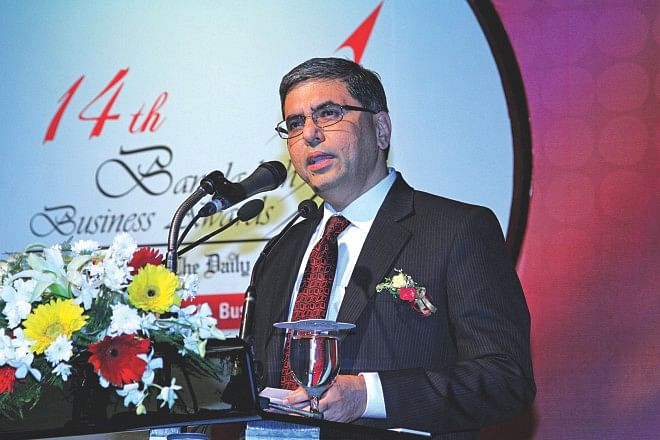Business for greater good

Growth at any cost should not be the target of the businesses any longer as the world is wolfing down resources at a much higher rate than the nature can replenish, said a top business executive.
Sanjiv Mehta, executive vice president of Unilever South Asia, said: "We are consuming resources at 1.5 times the planet's ability to replenish. In the Western world, it is three times."
"That's what is happening with our consumption and that is why it is very important to look at the lens from a business perspective."
The senior official of the world's one of the largest consumer goods companies made the remarks while presenting his keynote speech on capitalism at DHL-The Daily Star awards programme at Sonargaon Hotel in Dhaka on Friday.
"We can't have a world to be left behind which will be worse off for our children and grandchildren as compared to the world that we have inherited," he said.

A great believer of compassionate capitalism, Mehta said capitalism has played a major role in creating wealth and lifting millions out of poverty.
It took Great Britain 150 years and the USA 50 years to double their per capita income when their population was only 10 million, he said. India needed 60 years and China 12 years when their population was more than a billion.
Mehta, also the CEO of Hindustan Unilever Ltd, said when China and India started advancing, it was very clear that their population would become an albatross around their neck.
"Today, we are talking about a situation where one billion population of China or India or 160 million people of Bangladesh have become an asset because that is the kind of market you have."
"Certainly, capitalism has played a big part."
But Mehta, who led Unilever's Bangladesh operations for eight years before moving to India, wonders whether capitalism is the cure for all ills. "If you just look at the recent global financial crisis, it has been as much as a crisis of ethics and a crisis of home mortgages."
He quoted Irish Professor Charles Handy who wrote in his book "The Empty Raincoat: Making Sense of the Future" that capitalism depends on the fundamental principal of inequality.
"One percent of the global population controls the 40 percent of the global assets." Half the people in the pyramid do not have wealth at all, and are living below the poverty line.
"Of course, businesses have created wealth and are drivers of innovation, the harbinger of economic changes. But capitalism is clearly not a cure for all ills."
Mehta also talked about the role of the businesses in protecting the environment they operate in. "We as businesspeople can't be on the sidelines and just wait and look at the government for solution to solve our problem. We have to be part of the solution."

He also touched upon how Unilever is giving back to societies. "Today, our purpose is not to create immense wealth for our shareholders. Our purpose is to make a sustainable living commonplace."
In November 2010, Unilever launched Sustainable Living Plan globally to help more than a billion people to improve their hygiene habits and bring safe drinking water to 500 million people by 2020.
Unilever has already launched a special programme for Bangladesh called Lifebuoy Lifesaver. Twelve years ago, it set up Lifebuoy Friendship Hospital in Bangladesh to carry healthcare services to riverine areas where many people have not seen doctors in their life.
"We can't just sit idle and see our planet get destroyed. We have decided that while we grow and develop business we will reduce the environmental impact of our businesses."

 For all latest news, follow The Daily Star's Google News channel.
For all latest news, follow The Daily Star's Google News channel. 



Comments